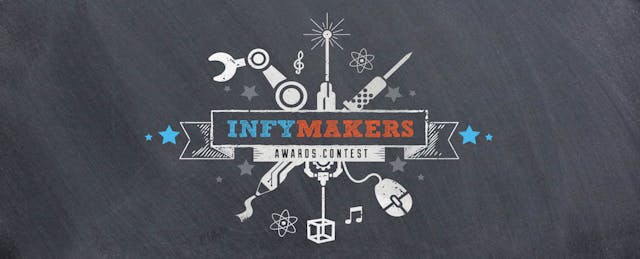Sending computers to schools isn’t the only way to skin the proverbial cat of getting students to code. Growing interest in project-based learning and the burgeoning Maker Movement have seen makerspaces playing a bigger role in schools as an opportunity to introduce students to a variety of creative disciplines—including computer science.
With the goal of creating interest in computational thinking as well as coding, the Infosys Foundation USA has introduced the Infy Makers Awards to encourage creation of makerspaces in schools, focusing especially on students and schools lacking resources and STEM proficiency.
Kaustav Mitra, VP of Innovation Ecosystems at the foundation, adds a bit more color. “Making, especially technology making as seen at the Maker Faire, is a great gateway drug for getting kids excited about engineering, especially coding,” Mitra tells EdSurge.
Fifty awards, worth $10,000 each, will be given to educators to create makerspaces. These educators must be nominated by the a winner of one of 50 awards that will be given to middle- and high-school for projects proposing innovative solutions in fields like social justice, robotics, health or energy. Student winners receive $1,000. Students who win can nominate a teacher, school, or outside organization. Adults 18 and over may also enter their projects for a chance to win one of 25 awards and $10,000 in prize money. These grants are unrelated to the educator grants. Adult entries opened September 25th. The Foundation considers applications on a rolling basis and will announce the first round of adult awards December 15th. Entries for students open December 1st and are also judged on a rolling basis. For full information on applying, visit the Infy Makers Awards website.
The Foundation attaches few stipulations to the grants and does not prescribe how educators should design their makerspaces. The foundation expects to award a broad range of educators, including STEM, English teachers and librarians. Part of the grants come “in kind” through a partnership with MakerEd, which trains educators to create and work in their own makerspaces and provides them with equipment.
In making the grants available to teachers of all subjects, Mitra hopes to emphasize that point that computational thinking is applicable to every discipline. “Assigning projects and asking students to understand their parameters, to know the goal state and manage all the elements are the same as computational thinking. They’re essential to any makerspace. It’s still very much the engineering approach to breaking down problems.” Still, he acknowledges that most makerspace projects will require some knowledge of coding. The Foundation hopes the flexibility will inspire long-term engagement, placing its trust in the Montessori model inherent in makerspaces. Student awardees are free to spend their prize money on whatever they wish.
“We’re operating on a ‘pull’ mechanism. We want students to want to have fun and learn,” Mitra said, "as opposed to pushing them to 'sit down and code right now.'"
The Infosys Foundation USA has been operating since March 2015. Its sister foundation in India, where the Infosys corporation is headquartered, has been operating for 20 years. While the Infosys Foundation India cultivates a wide portfolio of grants, Infosys USA is focusing on STEM education, especially computer science for minority and underrepresented students.
“There are structural and fundamental challenges that exclude large portions of society from [jobs in computer science],” Mitra tells EdSurge. “It is not that they do not qualify; they are not getting the opportunity to qualify. Children in Oakland see the Google bus drive by and have no way to get there. What are they missing in public schools?”
Infosys Foundation USA’s past grantees include Code.org, which supports women and underrepresented students of color learning computer science; Hack the Hood, which offers mentorship to students of color pursuing careers in tech; and DonorsChoose.org, which provides a platform for teachers to list their funding requirements for class projects and connect with donors.
One of the main constraints on the proliferation and establishment of makerspaces is funding, as industrial equipment does not come cheap. It is likely that more grants like the Infy Makers Awards and Make Magazines’s 2012 Best Education/Outreach Program Makey Award will crop up. Many of the makerspaces in place right now are dedicated only to STEM, so what comes of the flexibility allowed by Infosys's awards remains to be seen.


